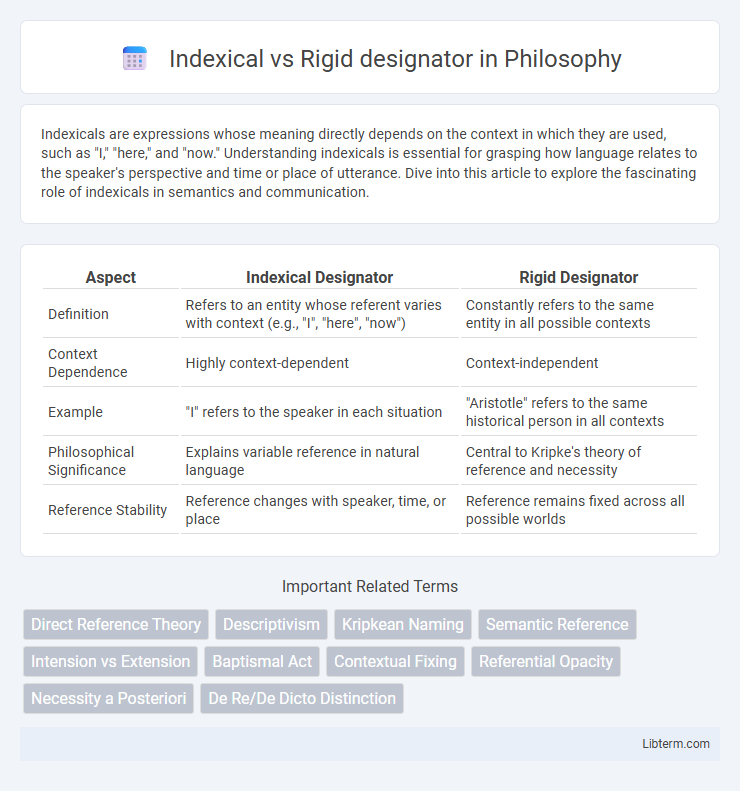Indexicals are expressions whose meaning directly depends on the context in which they are used, such as "I," "here," and "now." Understanding indexicals is essential for grasping how language relates to the speaker's perspective and time or place of utterance. Dive into this article to explore the fascinating role of indexicals in semantics and communication.
Table of Comparison
| Aspect | Indexical Designator | Rigid Designator |
|---|---|---|
| Definition | Refers to an entity whose referent varies with context (e.g., "I", "here", "now") | Constantly refers to the same entity in all possible contexts |
| Context Dependence | Highly context-dependent | Context-independent |
| Example | "I" refers to the speaker in each situation | "Aristotle" refers to the same historical person in all contexts |
| Philosophical Significance | Explains variable reference in natural language | Central to Kripke's theory of reference and necessity |
| Reference Stability | Reference changes with speaker, time, or place | Reference remains fixed across all possible worlds |
Introduction to Indexicals and Rigid Designators
Indexicals are expressions whose reference shifts depending on the context of utterance, such as "I," "here," and "now," making their meaning context-dependent. Rigid designators, a concept introduced by Saul Kripke, refer to the same entity in every possible world they occur, maintaining a constant reference regardless of context. Understanding the distinction between indexicals and rigid designators is crucial in philosophy of language and semantics to analyze how meaning and reference function in communication.
Defining Indexicals: Meaning and Examples
Indexicals are expressions whose reference shifts depending on the context, such as "I," "here," and "now," which rely on the speaker's identity, location, or time of utterance. Their meaning cannot be fully understood without situational information, distinguishing them from rigid designators that consistently refer to the same entity across all contexts. Classic examples include "I" referring to the speaker and "today" indicating the day of speaking, demonstrating how indexicals dynamically link language to context.
What Are Rigid Designators?
Rigid designators are terms in philosophy of language that refer to the same object in every possible world where that object exists, ensuring consistency in reference. Unlike indexicals, which depend on context to determine their referent (such as "I" or "here"), rigid designators maintain a fixed reference regardless of situational changes. Examples include proper names like "Aristotle" or natural kind terms like "water," which point to the same entity across all hypothetical scenarios.
Key Differences Between Indexicals and Rigid Designators
Indexicals are expressions whose referents change depending on the context of utterance, such as "I," "here," and "now," whereas rigid designators refer to the same entity in all possible worlds, regardless of context. The key difference lies in indexicals' context-dependence versus rigid designators' context-independence, with indexicals requiring situational information for proper interpretation and rigid designators maintaining a fixed reference. This distinction is crucial in the philosophy of language and semantics for understanding how meaning and reference operate across different contexts and possible worlds.
The Role of Context in Indexical Reference
Indexical designators rely heavily on the context of utterance to determine their referent, with expressions like "I," "here," and "now" shifting meaning depending on the speaker, location, and time. This context-dependency differentiates indexicals from rigid designators, which consistently refer to the same entity across all possible worlds regardless of context, exemplified by proper names like "Aristotle." Understanding the role of context in indexical reference is crucial for semantic theories addressing how meaning and reference function in natural language communication.
Rigid Designators in Philosophy of Language
Rigid designators, as introduced by philosopher Saul Kripke, are terms that refer to the same object in every possible world where that object exists, maintaining a constant reference regardless of varying circumstances. These designators contrast with indexicals, which change their referent based on the context of utterance, such as "I" or "here." In the philosophy of language, understanding rigid designators is crucial for analyzing necessity, identity, and meaning in modal logic and semantics.
Indexicality and Reference Shifts
Indexicals are expressions whose reference shifts based on the context of utterance, such as "I," "here," and "now," demonstrating indexicality where meaning is tied to the speaker's situation. Rigid designators, in contrast, refer to the same entity in all possible worlds without shifting reference, exemplified by proper names like "Aristotle." The concept of reference shifts in indexicals highlights how context-dependent elements dynamically alter semantic interpretation, essential in both linguistic pragmatics and philosophy of language.
Modal Contexts: Rigid Designators vs Indexicals
Rigid designators refer to the same entity in every possible world, making them crucial in modal contexts where truth values depend on necessity or possibility. Indexicals, such as "I" or "here," vary reference depending on the context of utterance and fail to maintain a constant referent across possible worlds. This distinction underscores the semantic rigidity of names like "Aristotle" contrasted with the context sensitivity of indexicals in modal logic and philosophy of language.
Implications for Linguistics and Semantics
Indexical expressions, such as "I," "here," and "now," depend on the context for their referents, contrasting with rigid designators like proper names that refer to the same object in all possible worlds. This distinction influences linguistic theories by highlighting the role of speaker context and temporal-spatial parameters in meaning determination. In semantics, understanding indexicals challenges static truth-conditional models, prompting dynamic approaches to meaning that accommodate variable referents linked to situational context.
Conclusion: Interplay of Indexicals and Rigid Designators
The interplay of indexicals and rigid designators reveals key insights into reference and meaning in language and logic. Indexicals depend on context for their referent, while rigid designators consistently refer to the same entity across all possible worlds. Understanding their relationship clarifies how language anchors meaning both contextually and necessarily, shaping semantics and modal logic interpretation.
Indexical Infographic

 libterm.com
libterm.com